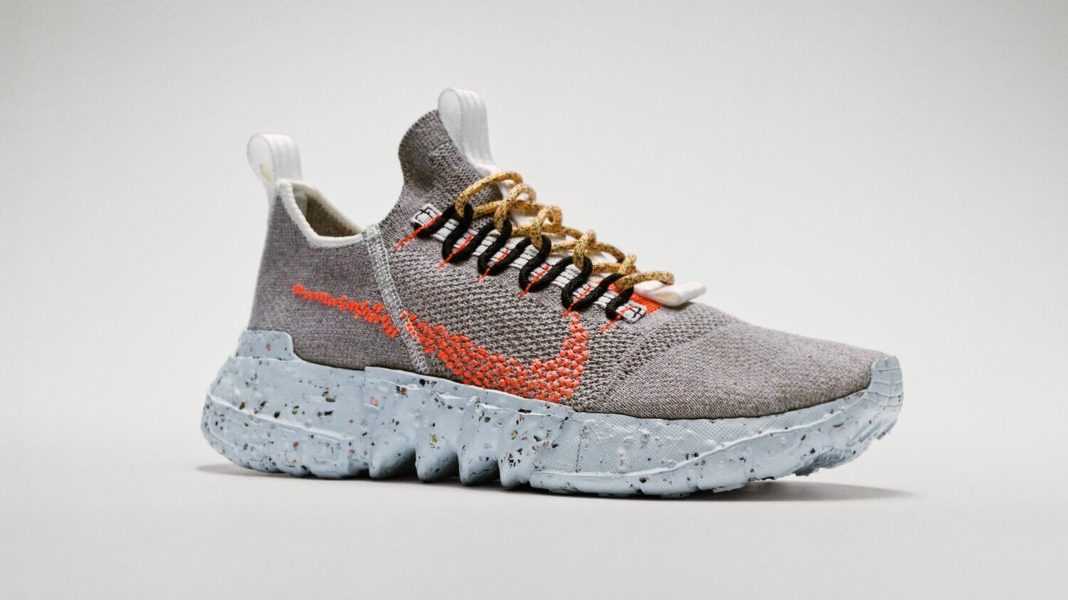Adrian Sol
Daily Stormer
February 15, 2020
That color scheme would go really well with, erm, dirty plaid pants? A used up potato sack?
The powers that be (i.e., Jews) apparently have decided that the next “big thing” that they’re trying to push is veganism.
Well, veganism and trannies.
I guess they’re offering veganism as an option for the large crowd of liberals who are trying to be “hip,” yet are feeling hopelessly left behind by the sheer insanity of the tranny and social justice movement.
Veganism is “safe” hipsterism, which allows bugmen to feel like they’re part of the progressive crowd simply by engaging in a certain type of consumerist behavior. After all, simply buying expensive crap that says “vegan” on the box is a lot more comfortable than hanging out with actual trannies and other mentally ill degenerates.
As such, the demand for “vegan” products is skyrocketing, as a result of the liberal desire for consumerist escapism from the current social insanity.
“Vegan sneakers” are just one example of big business taking advantage of this new craze.
Nike’s new “Space Hippie” line of sneakers are vegan and made from recycled trash.
The American sportswear company created four futuristic designs for the Space Hippie with environmental sustainability in mind. According to Nike, the vegan sneakers have the lowest carbon footprint scores of any shoe created by the brand so far.
“Space Hippie product presents itself as an artifact from the future.It’s avant garde; it’s rebelliously optimistic,” says John Hoke, Nike’s Chief Design Officer. “Space Hippie is also an idea. It is about figuring out how to make the most with the least material, the least energy, and the least carbon.”
The Space Hippie’s flyknit-based uppers use at least 85 percent rPoly—primarily recycled plastic water bottles, t-shirts, and yarn scraps. The sole uses 15 percent Nike Grind Rubber, combined with 100 percent recycled foam materials.
On one level, I’d like to investigate if these sneakers are truly more “sustainable” than regular Nike shoes, if you include the energy costs of the collection of waste, the recycling process, the production of the chemicals used in recycling, and so on and so forth.
But that’d be largely a waste of time, because it’s perfectly obvious that Nike doesn’t care at all about “sustainability” and the environment.
If they did, they’d put their efforts into making a shoe that’s as durable and easy to repair as possible.
These shoes can last for many years, and can easily be repaired by a skilled cobbler when damaged.
By contrast, all Nike product (just like other sneaker brands) produce fragile shoes that are basically impossible to repair, since all of their parts are made out of various molded plastics held together by glue.
Making “disposable” products out of “eco-friendly” materials is obviously a scam to part braindead hipsters from their money.
And those “Space Hippie” sneakers look like they wouldn’t last through 3-4 months of daily wear.
“I’d say Space Hippie attacks the villain of trash,” adds Hoke. “It’s changed the way we look at materials, it’s changed the way that we look at the aesthetics of our product. It’s changed how we approach putting product together.”
Nike’s “Move to Zero” initiative details the company’s goal of both zero carbon and zero waste. Many other sneakers, including Nike Air, now use recycled materials and renewable energy. And according to the company, the Space Hippie line represents a new benchmark in responsible shoe design.
“We believe the future for product will be circular,” says Seana Hannah, Vice President of Sustainable Innovation. “We must think about the entire process: how we design it, how we make it, how we use it, how we reuse it and how we cut out waste at every step.”
Nike is not alone in striving for more sustainable footwear. Adidas and marine advocacy group Parley teamed up in 2016 to create a line of training wear. The products use at least 75 percent upcycled marine plastic. Adidas has also released the Futurecraft.LOOP, a vegan and fully recyclable trainer.
Mainstream brands including New Look, Marks & Spencer, Topshop, and even supermarket chain Aldi, are all exploring vegan footwear.
Veganism is a fad.
And it’s not even a popular fad.
We’re talking about less than 2% of America, here – a number similar to the “paleo diet,” for example.
But Nike aren’t releasing paleo footwear made of nothing but mammoth bones and fur, nor is Burger King coming out with the paleo burger, where the bun is replaced with two additional meat patties.
Woah, that actually sounds pretty good… Someone needs to get on that.
In any case, as soon as this fad is forgotten (which is as soon as big business realizes that people aren’t going to be eating bugs anytime soon), all these stupid vegan products are going to be quietly dropped in the dustbin of history.
In the same way, “corporate environmentalism” is generally a scam as well. These companies never really fundamentally change the way they’re doing business to address real environmental concerns (like the destruction of the rainforest or the over-fishing of various marine ecosystems), but rather just change a few materials or ingredients here and there and call it a day.
“Real” environmentalism would necessarily entail not doing business with countries like China and India, who are doing most of the polluting. However, doing such a thing would cost companies a lot more than just making their shoes out of recycled water bottles, so they won’t do it.



